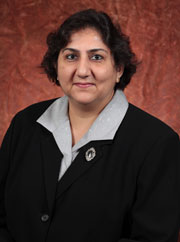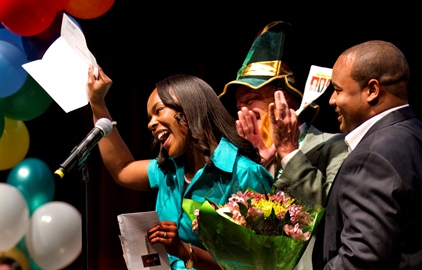Affectionately known as the mother of the Florida State University College of Medicine, Senior Associate Dean Myra Hurt has used her leadership skills to make numerous contributions to education, science and research in Florida.
Hurt was recognized for her efforts this week when she received the FL CURED Jim King Leadership Award in Tampa.
The annual award, presented by Florida’sCenter for Universal Research to Eradicate Disease (FL CURED), honors outstanding efforts to expand and enhance the state’s biomedical research enterprise and expedite cures. Hurt is the 2011 co-recipient of the award along with William Dalton, president and CEO of Moffitt Cancer Center.
The award is named after the late Florida Sen. Jim King, who sponsored legislation leading to creation of the Florida Biomedical Research Program.
Hurt is a professor of biomedical sciences and senior associate dean for research and graduate programs at the College of Medicine. Since 2006, she has served as a member of the advisory council that rates and recommends biomedical research projects for funding in Florida.
She was nominated for a seat on the nine-person council by Sen. King.
“I think it’s really gratifying to win this award that bears Jim King’s name because his legacy is, among other things, the biomedical research program his legislation created,” Hurt said. “We’ve certainly seen a challenging and difficult funding environment in Florida, where biomedical research plays a vital role in the health of our citizens and in driving our economy.
“The research funding Jim King made possible has, in some cases, been the only thing providing a chance for new investigators and researchers in Florida. That’s our future.”
Though Hurt has devoted a lifetime to scientific research and teaching, her work in pushing for a new medical school at Florida State is credited with a far-reaching impact in also promoting new research by others, both in Florida and nationally.
Florida State’s medical school was the first new M.D. program to open in the United States in nearly a quarter-century. The battle for approval ultimately led to the Association of American Medical Colleges (AAMC) reversing course on its previous stance that America had a physician surplus.
In 2006, the AAMC called for a 30-percent increase in medical school enrollment. That opened the door for a wave of new medical schools, including three in Florida, each of which is sponsoring a biomedical science research program.
“There is no doubt that Myra’s leadership stimulated, at least in part, this burst of activity,” wrote FSU College of Medicine Biomedical Sciences Chair Richard Nowakowski in his nomination letter.
“Myra has not rested on this success,” Nowakowski said. “She founded the Ph.D. program at the College of Medicine . . . and is starting a clinical research network that will provide a way for primary care physicians across Florida to meaningfully participate in translational research.”
College of Medicine Dean John P. Fogarty cited the rapid growth of the medical school’s biomedical research program as a testament to Hurt’s impact.
“She has brought her incredible energy and drive to build the research productivity and infrastructure in the past eight years,” Fogarty said. “Research success as measured by grants and contracts has increased by 500 percent in the past five years, and the College of Medicine now occupies 18 percent of the total research funding of the university.
“Dr. Hurt’s vision, leadership and lifetime commitment to medical education and research in Florida are exemplary.”
For more information about the College of Medicine, contact Doug Carlson at (850) 645-1255, (850) 694-3735 or doug.carlson@med.fsu.edu.
- About Us About Us
- Campuses Campuses
-
Academics
Academics
- Departments
- Degree Programs
- Divisions / Offices
- Residency Programs
-
Centers & Institutes
- Area Health Education Center
- Autism Institute
- Center for Behavioral Health Integration
- Center for Brain Repair
- Center for Child Stress & Health
- Center on Global Health
- Center for Medicine and Public Health
- Center for Rural Health Research & Policy
- Center for Translational Behavioral Science
- Institute for Pediatric Rare Diseases
- Education & Clinical Centers
- Admissions Admissions
-
Research
Research
- Division of Research
- Ph.D. Program
- Quick Links for Medical Research
-
Centers & Institutes
- Area Health Education Center
- Autism Institute
- Center for Behavioral Health Integration
- Center for Brain Repair
- Center for Child Stress & Health
- Center on Global Health
- Center for Innovative Collaboration in Medicine & Law
- Center for Medicine and Public Health
- Center for Rural Health Research & Policy
- Center for Translational Behavioral Science
- Institute for Pediatric Rare Diseases
- Translational Science Laboratory
- NCRT-CE Research Services
- Sponsored Funding Assistance
- Library
- Giving



